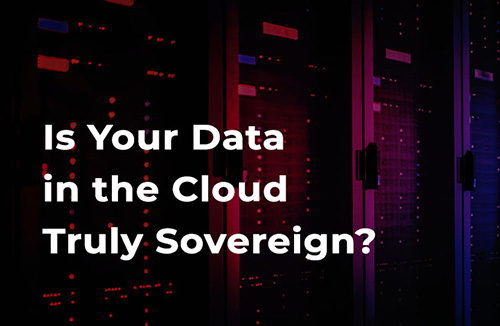Is Your Data in the Cloud Truly Sovereign?
In today’s digital economy, data is more than an asset. That’s why data sovereignty — the principle that data is subject to the laws of the country where it is collected — has become a cornerstone of national policy and enterprise strategy.
But what if sovereignty is more symbolic than substantive? What if the promise of control is undermined by legal loopholes, geopolitical pressure, or misleading terminology? What if data residency is being sold as data sovereignty?
This is the paradox of modern cloud infrastructure: sovereignty is often claimed, but rarely absolute.
The Illusion of Control
Governments and enterprises increasingly adopt sovereign cloud strategies to ensure sensitive data remains within national borders and under local jurisdiction. But sovereignty isn’t just about where data resides — it’s about who can access it.
Imagine a cloud service provider (CSP) that geo-fences your data within your country. Does that guarantee protection from foreign legal demands? Can extraterritorial laws still reach across borders?
Jurisdictional Entanglements
Extraterritorial regulations like the U.S. CLOUD Act and China’s Data Security Law complicate the sovereignty equation. These laws assert authority over data regardless of physical location, creating friction between national aspirations and global legal frameworks.
For multinational organizations, this introduces serious challenges:
- Conflicting compliance obligations across jurisdictions
- Exposure to cross-border subpoenas and surveillance
- Difficulty assuring regulators of true data control
The reality is stark: most hyperscale CSPs are either U.S.- or China-based. Their home governments can compel them to hand over your data — even if it’s stored in your country. Only CSPs outside these jurisdictions are immune to such extraterritorial reach.
Residency ≠ Sovereignty
Microsoft has acknowledged that it cannot guarantee data stored in its European cloud will be shielded from U.S. access under the CLOUD Act. If European data isn’t safe, what about data stored elsewhere?
Consider the case of TikTok. During Donald Trump’s first term as U.S. President, the platform was deemed a national security threat due to its access to American user data. In response, TikTok repatriated its data to U.S. soil via Oracle Cloud — a move toward data residency. But because TikTok remained Chinese-owned, concerns over data sovereignty persisted. The result? A forced divestiture to American ownership is now underway.
Denial of Service: A Hidden Risk
Sovereignty isn’t just about access — it’s also about availability. Your cloud provider can suspend or terminate services without notice. If your workloads support critical infrastructure, such disruptions can be catastrophic.
Case in point: EU sanctions on Russia inadvertently led to Nayara Energy’s cloud services being cut off — collateral damage in a geopolitical dispute.
Sovereignty Must Be Real, Not Rhetorical
The risk of foreign interference in your data and applications is not hypothetical — it’s happening. That’s why 1STACK, a sovereign cloud service by Starview Technologies, built on CloudSigma’s technology stack, was designed from the ground up to guarantee true data sovereignty.
Both companies are headquartered outside the U.S. and China, and are not subject to their extraterritorial data laws. This means your data stays under your control — legally, operationally, and geographically.
Ask the Right Question
If you’re building or evaluating a sovereign cloud, don’t just ask where your data lives. Ask who can touch it.
Sovereignty isn’t about borders — it’s about boundaries. Legal. Operational. Enforceable.
Protect Your Business
Contact us at sales@1stack.net to learn more.






